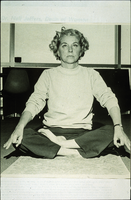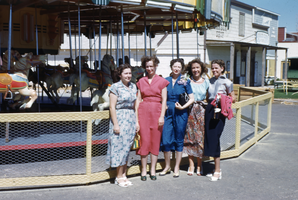Search the Special Collections and Archives Portal
Search Results
Soroptimist International Sierra Nevada Region Records
Identifier
Abstract
The Soroptimist International Sierra Nevada Region Records are comprised of memoranda, newspaper clippings, brochures, and communications from 1975 to 1998. The collection includes information about the Soroptimist International Sierra Nevada Region chapter's involvement with women's rights issues, primarily the Equal Rights Amendment ratification campaign in Nevada and California, as well as national efforts.
Archival Collection

Slide of Nell Jeffers, University of Nevada, Las Vegas, circa 1972
Date
Archival Collection
Description
Image
Lucille Bryant oral history interview
Identifier
Abstract
Oral history interview with Lucille Bryant conducted by Claytee White on December 13, 1995 and March 01, 1996 for the Women's Research Institute of Nevada (WRIN) Las Vegas Women Oral History Project. Bryant begins the interview discussing her early life in Tallulah, Louisiana. Next Bryant discusses moving to Las Vegas, Nevada to look for work in 1953. Bryant discusses at length life in Tallulah from work to race relations. Bryant goes on to discuss her husband and children and to describe their family life. Bryant lastly discusses her experiences as an African American woman employed as a housekeeper on the Strip and her involvement in the Culinary Union local 226.
Archival Collection
Nancy Houssels oral history interviews
Identifier
Abstract
Oral history interviews with Nancy Houssels conducted by Caryll Batt Dziedziak on November 18, 1998, December 07, 1998, and December 14, 1998 for the Women's Research Institute of Nevada (WRIN) Las Vegas Women Oral History Project. Houssels begins her interviews discussing her childhood in California and the influence World War II had on her upbringing. Houssels then talks about her dance training and career including topics on her auditions, her dance partners, and touring Europe in the 1960s. Houssels describes coming to Las Vegas, Nevada in 1968 where she was booked as a dancer in Folies Bergere at the Tropicana Hotel. Houssels then discusses the influences Mormonism and adiago ballet had on her life. Houssels then describes how she co-founded the Nevada Ballet Theatre with Vassili Sulich, performances of the company, their dancers, and community outreach.
Archival Collection

Transcript of interview with Harriet Trudell by Caryll Batt Dziedziak, May 3, 2006
Date
Archival Collection
Description
Born on August 22, 1935, Harriet spent her childhood years in the segregated southern cities of St. Petersburg, Florida and Mobile, Alabama. Daughter to a blue collar plumber, who was also a union organizer and ‘rabid Democrat,’ Harriet recalls her father saying, “Remember children, you know what meat tastes like because there’s a man named Franklin Roosevelt.” Unsurprisingly, she grew up thinking Roosevelt was God. With her mother’s sudden death at age thirty-one from a cerebral hemorrhage, ten year old Harriet spent two years at a boarding school before rejoining her younger brother at her maternal grandparents in St. Petersburg. Florida. During this time, her father also based out of the grandparents’ home while following big construction work opportunities at various cities. In 1948, sixteen-year-old Harriet accompanied her father, an Alabama Delegate, to the Democratic National Convention. Hearing Hubert Humphrey’s Civil Rights speech change her life. “I came home from that conve
Text

Video of interview with Gertrude Rudiak and Geri Rentchler by Adat Ari El Sisterhood, Las Vegas (Nev.), circa 2007
Date
Archival Collection
Description
Gertrude Rudiak and her daughter Geri Rentchler discuss their early lives in Las Vegas, including their experiences as a Jewish women and social activists in Southern Nevada.
Moving Image

Slide of Maurine Wilson and others, circa 1950s
Date
Archival Collection
Description
Image
Sarann Knight Preddy oral history interviews
Identifier
Abstract
Oral history interviews with Sarann Knight Preddy conducted by Claytee D. White on June 05, 1997 and March 11, 1998 for the Women's Research Institute of Nevada (WRIN) Las Vegas Women Oral History Project. Preddy begins her interview by discussing her upbringing in Oklahoma. Preddy then talks about moving to Las Vegas in 1942 and her first job at the Cotton Club. She then discusses moving to Hawthorne, Nevada, buying her club, the Lincoln Bar, and working for the local chapter of the National Association for the Advancement Colored People (NAACP). Preddy also talks about gaining gaming licenses for her establishments and about the migration patterns of the African American community in Nevada. She describes the Westside community, education, and prejudice in Las Vegas, Nevada. Lastly, Preddy describes important places and people in the Las Vegas community.
Archival Collection
D. D. Cotton oral history interview
Identifier
Abstract
Oral history interview with D. D. (Ethel Dolores) Cotton conducted by Claytee White on February 14, 1997 and March 21, 1997 for the Women's Research Institute of Nevada (WRIN) Las Vegas Women Oral History Project. In this interview, Cotton discusses the beginnings of her dance career in New York City, New York. Later in the interview, Cotton discusses working in Las Vegas, Nevada at the Cotton Club and her interactions with other African American entertainers. Cotton also discusses race relations and her experiences as an African American dancer in Las Vegas. Cotton later goes on to discuss her career change in the service industry.
Archival Collection
Faye Todd oral history interview
Identifier
Abstract
Oral history interview with Faye Todd conducted by Claytee D. White on October 15, 1996 for the Women's Research Institute of Nevada (WRIN) Las Vegas Women Oral History Project. Todd discusses her life in Las Vegas, Nevada starting in 1964 when she moved there with her husband. Todd details the variety of discrimination and racism she experienced while living in Las Vegas from service refusals to discriminatory hiring practices in hotels. Todd also discusses her career path, from taking adult education classes at Rancho High School to gain clerk skills, to eventually becoming Entertainment Director and Corporate Executive Assistant at the Landmark Hotel and Casino in 1976. Todd also discusses the challenges her husband faced as an African American chef. Finally, Todd also discusses class relations within the black communities of both Las Vegas and San Antonio, Texas, where she was born.
Archival Collection
